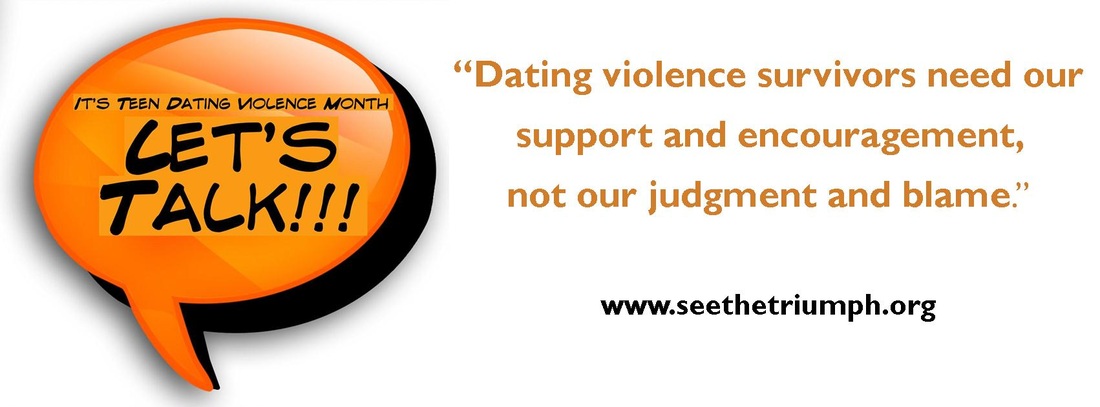|
2/17/2014 The Stigma Surrounding Dating ViolenceBy Christine Murray, See the Triumph Co-Founder
This February, we’ve been encouraging you to have conversations with the teens in your life about dating violence. We know, though, that these conversations are often very difficult to have. I believe that one of the reasons for this difficulty is stigma. The See the Triumph campaign is based on our research on the stigma surrounding intimate partner violence. We interviewed and surveyed survivors of intimate partner violence, and many of these survivors were involved in dating relationships. What we heard from these survivors was that stigma was often a major part of their experiences, both during their abusive relationships and afterward. Today, I want to share some of the experiences of the survivors in our studies that illustrate the stigma surrounding dating violence. To do this, I pulled out the subset of participants who said that they were in dating relationships or were in committed relationships but not living with their partners when we asked them to describe the highest level of commitment they had in their past abusive relationship. Next week, we’ll run a follow-up post that specifically addresses the isolation that teen dating violence survivors often feel as a part of that stigma. Today, I’ll focus on three other major aspects of stigma--blame, stereotyping, and shame. Blame Many of these participants noted that they were blamed for all or part of the abuse they experienced. One major source of this blame was the perpetrators themselves. For example, one participant said, “Each time I was abused, he would apologize after and say something along the lines of ‘I'm so sorry, I didn't mean to hurt you. It's just that when you do X, it really makes me mad and you should know that by now.’ I was blamed for everything and believed it was my fault, that was so difficult that I could actually push someone to beat me.” The blame often comes from other sources, too. One woman said this about her friends: “I was called a ‘slut’ and an attention-seeker by my friends. I was told I deserved it and it was my fault my boyfriend was sexually abusing and raping me. I was shunned by them, because he spread lies about me and they believed him over me.” Another participant said that her family blamed her: “My family was understanding at first but then wouldn't understand why I went back to him. After that they would be like ‘This is it. You're on your own. You're stupid for going back.’” Stereotyping Stereotyping is another major part of the stigma surrounding intimate partner violence. This means that people often hold images in their minds about what defines an abusive relationship and who abusers and victims are. Some of the experiences of our study participants illustrate how these stereotypes can prevent survivors from getting the support and resources they need. For example, one survivor said, “I feel as if I experienced discrimination and stereotyping by professionals (police officers, counselors) when I tried to get help or sometimes by individuals if I told my story. It's like they had one opinion of me (young, energetic, bright college student) but then when I disclosed the abuse none of that other stuff mattered about me. All they could see was this stereotype of an abused woman.” Another participant internalized these stereotypes: “Stereotypes of what relationship abuse looks like have created a big problem for me, because they prevented me from understanding for a very long time that what I experienced was emotional and sexual abuse. The stereotypes that exist about relationship abuse are still difficult for me, because I worry that admitting I was treated in abusive ways will make me look (and even feel) weak.” These quotes show just how harmful these stereotypes can be for survivors of dating violence. Shame In our research, we’ve come to view shame as blame turned inward. Many survivors have internalized the blame they experienced from others, which can lead to a negative self-perception. The following quotes illustrate just how deeply the shame surrounding dating violence can impact survivors:
All of the above quotes illustrate just how profound the stigma surrounding dating violence can be. Stopping this stigma is a major task, but I believe that continuing to raise awareness about dating violence and other forms of abuse is an important step in the right direction. Awareness is so important, especially for young people. By virtue of their age, young people have very limited relationship experience, and therefore it’s often difficult for them to know what is normal and healthy. For example, one of our study participants said, “I was not aware that was an abusive/violent relationship until I was directed by my advisor to read some articles about dating violence after I told my story to her. (I was just thinking that it is LOVE).” This quote also shows how powerful mentors can be in helping younger people identify unhealthy relationship patterns. We also need to help younger people learn the signs of unhealthy and unsafe relationships. This awareness can’t stop just when teens are entering relationships, because relationships can change, for better or worse, over time. Teen dating relationships often start off in a whirlwind of romance, and abusive patterns may not begin to show up until once the relationship has been established. For example, consider another of our participant’s stories:
Comments are closed.
|
Archives
July 2024
CategoriesAll About Intimate Partner Violence About Intimate Partner Violence Advocacy Ambassadors Children Churches College Campuses Cultural Issues Domestic Violence Awareness Month Financial Recovery How To Help A Friend Human Rights Human-rights Immigrants International Media Overcoming Past Abuse Overcoming-past-abuse Parenting Prevention Resources For Survivors Safe Relationships Following Abuse Schools Selfcare Self-care Sexual Assault Sexuality Social Justice Social-justice Stigma Supporting Survivors Survivor Quotes Survivor-quotes Survivor Stories Teen Dating Violence Trafficking Transformative-approaches |
Search by typing & pressing enter



 RSS Feed
RSS Feed